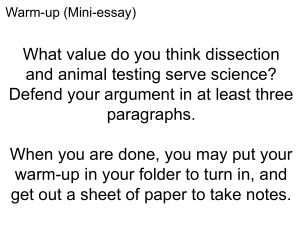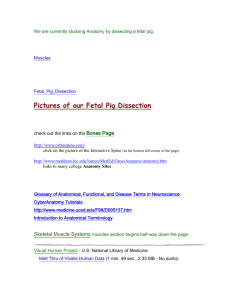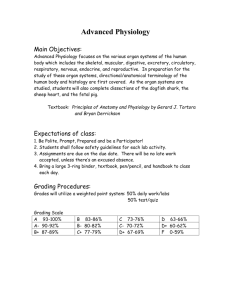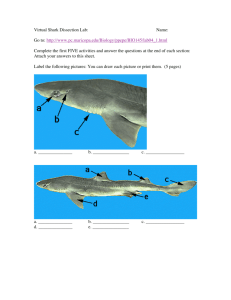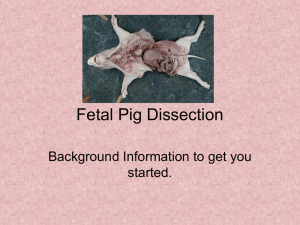A&P II 2320/2320 Winter 2010 - Faculty Sites
advertisement
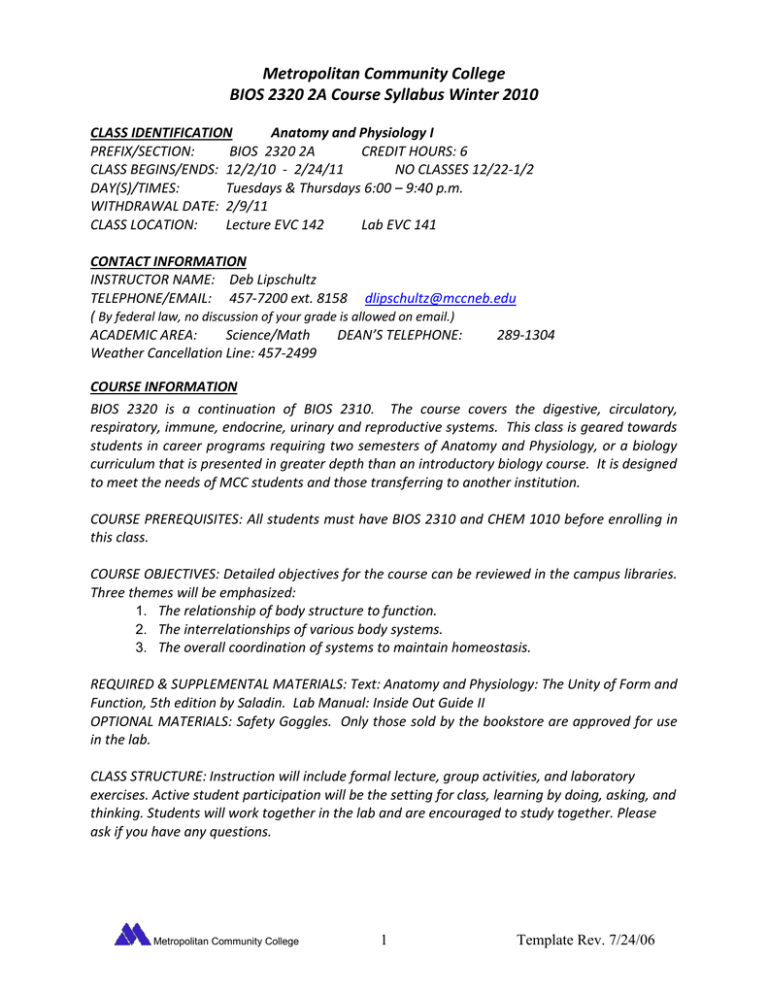
Metropolitan Community College BIOS 2320 2A Course Syllabus Winter 2010 CLASS IDENTIFICATION Anatomy and Physiology I PREFIX/SECTION: BIOS 2320 2A CREDIT HOURS: 6 CLASS BEGINS/ENDS: 12/2/10 - 2/24/11 NO CLASSES 12/22-1/2 DAY(S)/TIMES: Tuesdays & Thursdays 6:00 – 9:40 p.m. WITHDRAWAL DATE: 2/9/11 CLASS LOCATION: Lecture EVC 142 Lab EVC 141 CONTACT INFORMATION INSTRUCTOR NAME: Deb Lipschultz TELEPHONE/EMAIL: 457-7200 ext. 8158 dlipschultz@mccneb.edu ( By federal law, no discussion of your grade is allowed on email.) ACADEMIC AREA: Science/Math DEAN’S TELEPHONE: 289-1304 Weather Cancellation Line: 457-2499 COURSE INFORMATION BIOS 2320 is a continuation of BIOS 2310. The course covers the digestive, circulatory, respiratory, immune, endocrine, urinary and reproductive systems. This class is geared towards students in career programs requiring two semesters of Anatomy and Physiology, or a biology curriculum that is presented in greater depth than an introductory biology course. It is designed to meet the needs of MCC students and those transferring to another institution. COURSE PREREQUISITES: All students must have BIOS 2310 and CHEM 1010 before enrolling in this class. COURSE OBJECTIVES: Detailed objectives for the course can be reviewed in the campus libraries. Three themes will be emphasized: 1. The relationship of body structure to function. 2. The interrelationships of various body systems. 3. The overall coordination of systems to maintain homeostasis. REQUIRED & SUPPLEMENTAL MATERIALS: Text: Anatomy and Physiology: The Unity of Form and Function, 5th edition by Saladin. Lab Manual: Inside Out Guide II OPTIONAL MATERIALS: Safety Goggles. Only those sold by the bookstore are approved for use in the lab. CLASS STRUCTURE: Instruction will include formal lecture, group activities, and laboratory exercises. Active student participation will be the setting for class, learning by doing, asking, and thinking. Students will work together in the lab and are encouraged to study together. Please ask if you have any questions. Metropolitan Community College 1 Template Rev. 7/24/06 ASSESSMENT OF STUDENT WORK Since test questions come from lectures and labs, it is important to attend class. A tentative test schedule is included in this syllabus. All tests are subject to change, and so tests will always be announced at least one week prior to the test. Tests will include multiple choice, matching, and short answer questions. There will be a lab identification exam before the written test. Tests will not be returned to students. 6 exams will be offered, and 5 of those scores will be counted towards your grade. One of the 6 exam scores will be dropped. There are no makeup exams. If you take the 5 unit exams as scheduled then the comprehensive final becomes optional, as it becomes the lowest exam score. Types of Assessment/Assignments (600 pts total) a. 5 unit exams (100 pts each) - will have a lab and lecture component and ten bonus questions. b. One optional or make-up comprehensive final exam(100pts) c. Mandatory Metro comprehensive final(25pts) d. One In-class clinical case study presentation with answers to questions (25 pts) e. Labs (20 pts) f. Quizzes (30 pts) best three out of five No Late Assignments Exam Schedule: (All dates subject to change.) Exam 1 Metabolism: December 16 Exam 2 Transport: January 14 Exam 3 Homeostasis: January 27 Exam 4 Regulation: February 10 Exam 5 Development: February 24 Grading Policy Your grade will be determined by adding together all the points you have earned on exams and written assignments. That total will be divided by the total number of points for a percent score. A = 90 - 100% B = 80-89% C = 70 - 79% D = 60 - 69% F = 0 - 59% Maintenance of Student Records Your exam scores will typically be available the next class meeting day after the exam. All grade records, test, papers, projects will be maintained for a minimum of one year. STUDENT EXPECTATIONS Attendance Policy: You are expected to attend class, but are not required to except on exam days. Any work or information you miss in your absence is your responsibility. Expected Classroom Behavior: Students are not allowed to engage in behaviors that are disruptive to the teaching/learning process. Students are not allowed to use cell phones, i Pods® and other portable electronic devises in the class or lab. You may use your laptop to take notes. You are not allowed to access internet sites in class. No children are allowed in class or lab. Metropolitan Community College 2 Template Rev. 7/24/06 Notice: This syllabus is written as an expectation of class topics, learning activities, and expected learning outcomes. However, the instructor reserves the right to make changes in this schedule that may result in enhanced or more effective learning for students. These modifications will not substantially change the intent or objectives of this course and will be done within the policies and guidelines of Metropolitan Community College. LEARNING SUPPORT Metro's Learning, Math, and Writing Centers can help you achieve educational success. The staff in these centers provide drop-in assistance with basic math, reading, writing and computer skills. We offer a friendly, supportive learning environment. Self-paced computer-assisted instructional support in reading, vocabulary, typing, English as a Second Language, and online course orientation is also available. Detailed information about these services are in the Student Handbook, College Catalog, and online. Links to these resources are located at http://www.mccneb.edu/learningcenter/. COLLEGE POLICIES College policies, such as student rights and responsibilities, academic standards, plagiarism, and etc. are outlined in the College Catalog and Student Handbook. This information can be accessed via the online catalog at http://www.mccneb.edu/academics/catalog.asp. STUDENT WITHDRAWAL: If you cannot attend and complete this course, you should officially withdraw by calling Central Registration, 457-5231. Failure to officially withdraw will result in either an instructor withdraw (IW) or failing (F) grade. The last date to withdraw is identified on the second page of this syllabus handout. STUDENT CODE OF CONDUCT: The college has a standard code of conduct that involves consequences for specific academic and non-academic behavior that may result in a failing grade, probation, or suspension from the college. More complete information about the code of conduct is located in the Student Services portion of the online catalog (http://www.mccneb.edu/catalog/studentinformation.asp). ACCOMMODATIONS FOR STUDENTS WITH DISABILITIES: If you have a disability that may substantially limit your ability to participate in this class, please contact a Vocational Special Needs Counselor, located in the Student Services Office on each campus. Metropolitan Community College will provide reasonable accommodations for persons with documented qualifying disabilities. However, it is the student’s responsibility to request accommodations. For further information, please contact the Student Services Office at your campus. IMPORTANT COLLEGE DATES: Can be accessed at http://www.mccneb.edu/academics/calendar.asp?Theme=2 Metropolitan Community College 3 Template Rev. 7/24/06 BIOS 2320 Winter 2320 Lab Schedule Tue. Thurs. – Wasmoen, Porter, Lipschultz METABOLISM Test December 14 Date Labs 12/2 1 – 16 12/7 17 (fetal pig dissection) 12/9 1 – 7 (enzyme action) 12/14 1 – 8 (food utilization) TRANSPORT Test Jan 13 12/16 1 – 9 (cardiovascular system) 12/21 10 , 11 (vessels, fetal pig dissection) 1/4 1 – 5 (cardiovascular health) 1/6 1 – 16 (respiratory sys., fetal pig dissect.) 1/11 1 – 3 (breathing mech.); 1 – 5 (lifestyle) HOMEOSTASIS Test Jan 27 1/13 Acid-base homeostasis 1/18 1 – 8 (blood) 1/20 Lab problems for defense vs. invasion 1/25 No lab scheduled REGULATION Test Feb 10 1/27 1 – 6 (endocrine system) 2/1 7 – 10 (endocrine system) 2/3 1 – 7 (urinary sys., fetal pig dissection) 2/8 1 – 12 (urinalysis) DEVELOPMENT 2/10 2/15 2/17 2/22 2/24 Test Feb 24 No lab scheduled 1 – 16 (reproductive systems) 17 – 20 (life before birth) Fetal pig dissection NO LAB Metropolitan Community College 4 Template Rev. 7/24/06 Day 1 2 Date Inside Out section METABOLISM Digestive system (Begin pig dissection) 3 Digestive process 4 Food Utilization 5 EXAM #1 =================== TRANSPORT Cardiovascular system (continue dissection) 6 7 Text resources: Saladin, ed. 5 Ch. 25 Ch. 5, p. 157 (columnar epithelium) Ch. 26, pp. 1014 – 1017, pp. 1031 - 1036 Ch. 19, 20 Ch. 29, p. 1129 - 1131 (fetal circulation) Cardiovascular health Respiratory system Ch. 22 Ch. 5, pp. 157, 178 (ciliated epithelium) 8 Breathing mechanism 9 Lifestyle diseases 10 EXAM #2 =================== HOMEOSTASIS Acid-base balance 11 Blood 12 Defense Against Loss Ch.19, 20, 22 Ch. 24. pp. 942-948 Ch. 18 Metropolitan Community College 5 Template Rev. 7/24/06 13 14 Defense Against Invasion Ch. 21 EXAM #3 ========================= REGULATION Endocrine System Ch. 17 15 Endocrine System 16 Fluid Homeostasis Ch. 24 pp. 943-948 Urinary System (continue dissection) Ch. 23 Ch. 5, p. 159 (transitional epithelium) Urinalysis Ch. 23, pp. 928-930 17 18 EXAM #4 ======================== DEVELOPMENT Sex Hormones 19 Reproductive Systems (conclude dissection) 20 Reproductive Systems Ch. 27, pp. 1048-1050 Ch. 17, p. 653, 673 (adrenal) pp. 655-656 (gonads) Ch. 27, 28, 29 Live Before Birth 21 22 Aging Ch. 29, pp. 1139-1146 EXAM #5 Metropolitan Community College 6 Template Rev. 7/24/06 SAFE LABORATORY WORK HABITS For your safety and that of other students working with you, be aware that using equipment and chemicals in the laboratory involves a degree of risk. This risk is minimal if you are conscious of safe practices and follow them. Metropolitan Community College does not carry medical insurance on or for students. General Policies: 1. College policy does not allow smoking, eating or drinking in the classrooms or laboratory. You are not allowed to bring food or drinks into the science areas. 2. The classroom will not be locked or supervised while the students are in the laboratory. Keep anything of value with you at all times. 3. While in the laboratory, place personal belongings (purses, books you won’t need, etc.) on side counters or in empty drawers at the lab stations. Do not place these items on the work surfaces. Normally, you should only need your laboratory guide, and possibly your class notebook and textbook. All other items crowd your work area or someone else’s. Anything placed on the floor must be out of the traffic path. 4. Work may be done in the laboratory only under the supervision of an instructor. Normally this means that work can only be done during regularly scheduled class time. Make-up labs are difficult to set up due to the large number of classes that use the lab. Also, the value of working with others and learning in a cooperative fashion is lost when you are not in attendance. 5. Before operating equipment or beginning any procedure, be confident that you know what to do and how to do it. If unsure ask the instructor or laboratory assistant. 6. Safety glasses and gloves are provided for use by the student, and must be worn as directed by the instructor. Lab coats are also available for your use if you desire. 7. Keep long hair tied back, and loose sleeves and cuffs rolled up to avoid passing them through an open flame or getting them caught in equipment. 8. Report all accidents - any injury to yourself, or any broken glassware or equipment to the instructor immediately. 9. Leave your work area clean when you are finished. 10. Wash your hands after handling chemicals or microorganisms. _______________________________________________________________________ I have read the laboratory policies pertaining to this course. I understand their importance to my safety and that of others, and agree to abide by them. I also have received and read the course syllabus. Name___________________________ Metropolitan Community College Date________________ BIOS 2310 7 Template Rev. 7/24/06
